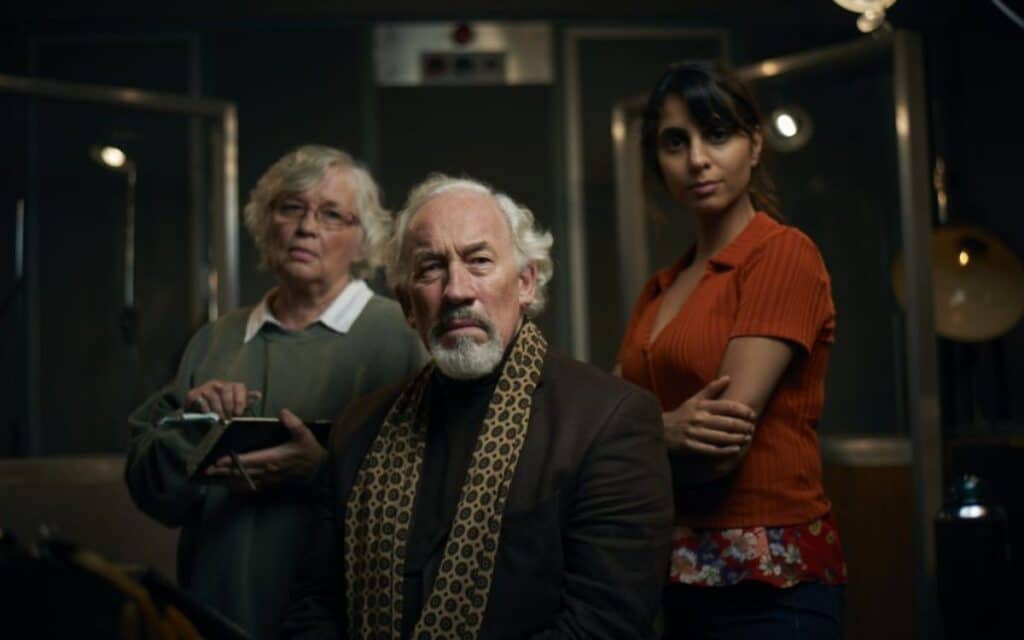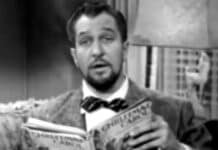The Dead Room 2018 is atmospheric but predictable and overly derivative addition to the legendary A Ghost Story for Christmas series, writes RICHARD MARKWORTH

TITLE: The Dead Room
RELEASE DATE: 24 December 2018 on BBC Two
DIRECTOR: Mark Gatiss
CAST: Simon Callow, Anjli Mohindra, Susan Penhaligon, Joshua Oakes-Rogers
Review of The Dead Room 2018
Five years on from his A Ghost Story for Christmas debut, The Tractate Middoth 2013, writer and director Mark Gatiss returned to the series with The Dead Room.
On this occasion, Gatiss decided to abstain from adapting the works of M R James, instead choosing to create an original drama. He also opted to set his tale in contemporary times as opposed to producing a more traditional period piece and it is clear from the outset, he intended to place his own stamp on the series with this entry.
The story opens to the rich tones of veteran performer Aubrey Judd (Simon Callow) as he narrates the latest episode of his long running supernatural radio show The Dead Room. We learn this is the first time the programme has been recorded in its original, soon to be decommissioned, studio for several decades. Its dimly lit depths make an ideal setting for a ghostly yarn, particularly as it is only Judd, producer Tara (Anjli Mohindra) and the perpetually silent sound effects provider, Joan (Susan Penhaligon), rattling around its vast, gloomy interior.
Judd is a somewhat self-important individual, ruing the passing of the golden days of his career, happy to correct Tara’s grammar and to criticise the material he is forced to work with. A politically incorrect man at odds with today’s world, he states his dislike for social media and how nowadays the public “know every little thing”. Apart from being generally curmudgeonly this gripe is an early indicator the actor may have aspects of his own life he would rather keep private.
In conversation with Tara, we learn Judd inherited the mantle of Dead Room presenter from predecessor Seymour Rand following the latter’s demise. However, any question mark raised as to whether the circumstances of Seymour’s death have something to do with Judd’s desire for privacy is refuted by the thespian almost immediately.
While deriding the current crop of horror writers and harking back to the greats, Judd references M R James, a knowing nod to A Ghost Story for Christmas mainstay, and informs his puzzled producer, he did not “remove a stair rod” a la The Stalls of Barchester Cathedral to obtain Seymour’s position. This swiftly eliminates an early red herring raised in Gatiss’ narrative.
Judd goes on to pompously lay out his own rules for a successful supernatural thriller to Tara, including his belief the spectre should hail from a period within living memory to be effective. In a rather sledgehammered moment of foreshadowing Tara muses on whether a ghost from the 1970s would work.
As the thespian resumes his narration of the radio play, he is confused and annoyed to observe the script diverges from the original plot concerning a haunted computer game, to text describing a young man. Furthermore, Tara and Joan appear to have vanished, and Judd is now alone. Apart, that is, from a shadowy figure silently observing him from a gantry.
The reappearance of Tara breaks the spell and Judd notices the script has returned to normal. However, the sudden sounding of Tara’s mobile ring tone, “S-S-S-Single Bed” by Fox, a chart hit in 1976, unsettles him further.
Judd resumes work but his script mysteriously alters again, and the Fox song can be heard once more. The entertainer experiences haunting visions of a young man and hears his own voice relaying a tale of a summer romance. Next, Judd’s name is shockingly screamed aloud by someone unseen.
Upset and angry, Judd rounds on a bemused Tara. He accuses her of playing a prank on him before eventually breaking down and recounting the story of his love affair with Paul, a younger man, back in the scorching summer of 1976. A time when homosexuality was still frowned upon by many in society and could potentially ruin a man’s career if revealed to the world. Judd claims his “too perfect” romance was brutally ended when Paul went swimming alone in a local reservoir to escape the heatwave and tragically drowned, leaving the star bereft and unable to publicly mourn his lover.
Judd eventually concludes his recording but, as further disturbing flashbacks occur, the true version of those fatal events in 1976 is revealed and the actor must face a final confrontation with the ghosts, both figurative and literal, of his past.
The Dead Room is a solid stab at producing a modern version of the classic ghost story but, unfortunately, falls short in some regards. Having Judd namecheck his own literary inspirations was presumably intended as an affectionate tribute by Gatiss to some of his favourite authors, but this only serves to draw comparison between their respective works. Sadly, this is to The Dead Room’s detriment.
Regrettably, the plot itself is decidedly thin with a denouement which is wholly predictable for anyone who has viewed similar fare and therefore unlikely to leave any lasting impact on seasoned genre fans.
Furthermore, the sequence in which Judd details his storytelling “rules”, while a clever way to set up the forthcoming action, could also be construed as a less than subtle attempt to convince the audience what they are about to witness is the “proper” way of presenting such a tale and a means to head off any potential criticism.
There are, however, notable plus points to the production. Gatiss utilises the eerie setting of the recording studio to great effect, successfully presenting the building as a dark, ominous environment whose tenebrous corners seem rife with the possibility of lurking phantoms.
Callow is splendid in the lead role and utterly dominates the piece, convincingly breathing life into Judd by adding necessary nuance to a character who could easily have been a mere cliched “luvvie”. His blackly humorous exchanges with Mohindra as he bemoans the present day in a wholly non-PC manner are a particular highlight, with Callow perfectly articulating the frustrations of an older man, disgruntled with a world which is rapidly leaving him behind.
Although The Dead Room does not reach the lofty bar set by the classic 70s entries in the A Ghost Story for Christmas strand, it remains a valiant effort by Gatiss to produce his own take on the form and he clearly relishes adding to the existing canon whilst maintaining a reverence for the past.
Ironically, despite his attempts at modernisation, Gatiss’ offering wears the influences of its predecessors a touch too heavily on its sleeve, thereby preventing this presentation from standing out in any meaningful way and leaving it as something of a missed opportunity.
Tell us your thoughts on The Dead Room 2018 in the comment section below!







